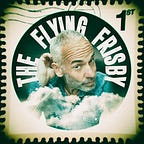I went to the ARC conference yesterday - to give it its full name the Alliance for Responsible Citizenship. It is an organisation set up by Jordan Peterson, Paul Marshall, Philippa Stroud, Alan McKormick and others to “develop a better narrative in response to life’s most fundamental social, economic, philosophical and cultural questions”.
I spent much of the day taking notes, and I thought I’d write them up here so that readers can enjoy a distilled version, without the rigours of having to travel to the depths of London SE and sitting through a lot of talking.
“What’s it like?” Merryn Somerset Webb texted on her way in that morning. “A bit like a religious gathering,” I replied, (something Tim Stanley also observed in a barbed piece in the Telegraph). I’m quite happy with that, because I am one of the believers.
I have to say the organisers have put together quite a roster of speakers, one massive oversight aside, which was not having me speak.
Philippa Stroud and Jordan Petersen hosted the morning events, which began with recently removed US speaker of the house Kevin McCarthy. Peterson, who had made a brave choice of suit even by his standards - and, I say with a little concern, looked exhausted - made the point that we each have a responsibility to do our own little bit, if we are to improve things.
In this Noah’s Flood of podcasts through which we are currently living, I’m kind of done with conversations. So many people now just seem to be regurgitating the words of others. So few seem to say anything original or interesting. We are caught in this media merry-go-round in which everyone is just commenting on what everyone else has said and nobody actually seems to be creating anything. Moreover, I am kind of done with panels. Three guests, sitting on chairs, a host, who keeps opening it up the the audience, where the conversation then loses all direction. Give me strength. It’s always a good way to go into an event with low expectations because when reality exceeds expectation you end up happy. So it was here. (Read more on the secret of happiness). Laurence Fox, who is a buddy and with whom I hung out, was in a similarly jaded frame of mind. The right is great at identifying what the problem is, he said to me over coffee and a fag, but no good at doing anything about it. The problem, I suggested, is that many don’t actually know what to do, which is why so much talking goes on. Perhaps the answer lies in Peterson’s solution. We each have to do our own little bit in our own little worlds, doing whatever we do. That’s the nature of free markets and free everything: it starts with the individual and it is a bottom-up thing.
The first panel was about narrative. That had former Aussie deputy PM John Anderson, who was excellent on the fact that in the Anglosphere, we have stopped telling our own story and, as a result, lost sight of who we are and what we stand for. This was a recurring theme throughout the day. Somali-Dutch activist, Ayaan Hersi, talking about Hamas and Islamic extremism, added that “their story is not your story and your story is not their story”, so it is never going to work. She may not have meant it, but that is actually quite a strong argument against multiculturalism. And I loved this line from US author Os Guiness: “freedom is not the power to do what you like. It is the power to do what you ought”
I went into the break keen to do my own little bit and put the world right, and ran into my old boss from GB News, Angelos Frangopoulos, who was similarly invigorated. I had a good chat with him. I then ran into Jimmy Carr, of all people, who I know of old, and had a good chat with him too. I then met Holly Valance, who is a famous actress from Neighbours, if you didn’t know (I didn’t) and had a good chat with her about home education. So, never mind the roster of speakers, the calibre of audience was pretty good too.
The next session was hosted by Fraser Nelson of the Spectator, another of the many UK media outlets which has forgone the opportunity to give me work. There was a talk by MP Miriam Cates about mental health and the decline of family. I agreed with pretty much every point she made, but don’t read your speeches, speak them, Mmiriam. They have more impact when you do.
Next Nelson would interview a chap over videolink to the states, Jonathan Haidt, and my heart sank. Why have I come all this way to watch a live zoom call? Guess what? It was brilliant.
It was about children and mobile phones. Moral of the story? Don’t let your kids anywhere near them. Mental health, depression, anxiety and suicide rates among young women in the Anglosphere and Nordic countries are all all at all time highs. They are not so bad among religious conservatives, they are much higher in cultures where female independence is strong, especially left wing, secular liberals (who tend to be allowed on their phones more). It has rocketed since 2010 when we all got smartphones.
He talked about the importance of play amongst children, and how we have replaced a play-based childhood with a phone-based childhood. Kids see each other and socialise far less now than they used to. Kids don’t need connections. They don’t need retweets and likes. Even less do they need all the bullying and shaming that goes on. Tiktok messes with your mind and your ability to concentrate, but Instagram is the worst for women and mental health.
Haidt’s solution was not to give kids a smartphone before the age of 14, give them flip phones. No social media before the age of 16. No phones in schools, not even in your backpacks otherwise kids will find a way to feed the addiction. Get back to play.
The rise in teenage suicide is perhaps the biggest problem since we wiped out polio, cholera and mass disease.
So to the afternoon …
In the afternoon, Paul Marshall gave a brilliant talk. For someone who is supposed to be shy and retiring, he was great - and he didn’t read his speech, or if he did it didn’t show. He was particularly good on one of my pet hates, crony capitalism. (I even wrote a song about it).
He observed how we have benefited from capitalism and free markets, peppering his talk with great historical stories. He bemoaned the conflation of capitalism with monopolistic capitalism, crony capitalism and, what he called swamp capitalism, describing US politics as “continuity swamp”, and called for a politician with strength to stand up to vested interests. He didn’t say anything particularly new, but it was one of the best summaries of everything I had heard in a long time. We are both singing so loudly from the same song sheet, I felt he must have been studying my stuff (I doubt he has), though he didn’t mention the zero patients in all of this: our systems of money and tax.
Then there was another video link with US presidential candidate, Vivek Ramaswamy, on the campaign trail in Utah or somewhere I’ve never been to. He went down very well in the room too. Merryn Somerset Webb hosted a good panel on ESG investing. The S in ESG is totally subjective, said Derek Kreifels, while Terry Keeley called it the biggest misallocation of capital in history. The general takeaway is that ESG is done. The arguments have been lost, even the FT is now slagging it off. It is, I’d say, roughly where the Nazis were in 1943 after they failed to take Moscow and winter set in.
Michael Shellenberger, not a man with whom I was previously familiar, was next and he came out with my line of the day. “Pull back the curtain and there is no Wizard of Oz, just Greta Thunberg with a really bad religion.”
His main theme was debunking climate alarmism. He argued that carbon emissions are improving, sea levels are not an issue if the Netherlands is anything to go by. The reason northern countries are so wealthy is that the harsher conditions forced us to develop more. Deaths from climate disasters are down 90%, he said, against a population that is four times bigger. He is more worried about death from drugs. You can’t say much of this on the internet though because you get censored.
Climate change is a religion. Nihilism leads to secular religions, and not very good ones. There are three new secular religions: they are climate, race and gender. Climate change is also a psychopathology, and most activists have some kind of personality disorder, often narcissism. Frequently they are just spoilt children.
The answers lie in increased efficiencies. The fact that the amount of land required to make the same amount of food is decreasing is good: it means more land for nature. The fact that less material is required to do stuff (eg all the things you can do on your phone, a bluetooth speaker vs a stack stereo kit from the 1980s) is another example.
Think of the woman who used to have to cook food using dung and wood. Gas has been liberating for her. The solutions lie in gas and nuclear. Not in solar, the panels for which are made by slave labour in concentration camps in China, nor in wind, the blades of which do not recycle or decompose.
A panel next with Alex Epstein and Marian Tupy made similar points, and was great. Epstein’s argument was that so much of environmental philosophy is just anti-human. That’s the underlying problem. We ignore the human flourishing effects of fossil fuel to be anti-human. While Tupy pointed how much better we are producing resources and using them so that their prices fall. Eventually we will create elements through nuclear fission or mine them in outer space where they are plentiful. I liked Tupy.
Humans create as well as destroy. Atoms may be finite, but knowledge is infinite, and the more knowledge you consume, the more you end up with.
We need freedom and we need population. We need the freedom to explore, the think, to invent, to experiment. And it is so much better when the market, not the government, chooses the winners.
In the final session of the day, historian Niall Ferguson spoke. He described how liberal democracy, which in the context of the world today and of history, is tiny, is now under threat, both from within - so many now dare not speak or explore issues because they are scared of the backlash - and from outside. Beware the alliance between China, Russia, Iran and North Korea.
I’d had enough talking by this point, so I left the auditorium, had a cup of tea and did some networking.
I hope this summary was useful.
In other news, I am working on a piece on S&P500, which could be set up for a good year end rally. I am also working on something to do with gold. It is finally catching a bid. New highs around the corner? Maybe. We are going to need them if juniors are to finally catch a bid.













